Impact of Culture & Motivation on Behaviour: Tesco Plc Analysis
VerifiedAdded on 2023/06/10
|21
|6263
|127
Report
AI Summary
This report provides an analysis of organisational behaviour within Tesco Plc, a UK-based supermarket chain. It examines how organisational culture, power dynamics, and workplace politics affect individual and team behaviour, influencing overall performance. The report explores various cultural types (power, task, role, and person) and power forms (rewarded, coercive, legitimate, referent, and expert) within Tesco. It also discusses the impact of positive and negative workplace politics on employee morale and productivity. Furthermore, the report analyses the role of motivation in achieving organisational goals, differentiating between personal and professional motivational factors. The document aims to critically evaluate the interplay between culture, politics, power, and motivation, offering insights into improving team and organisational success.
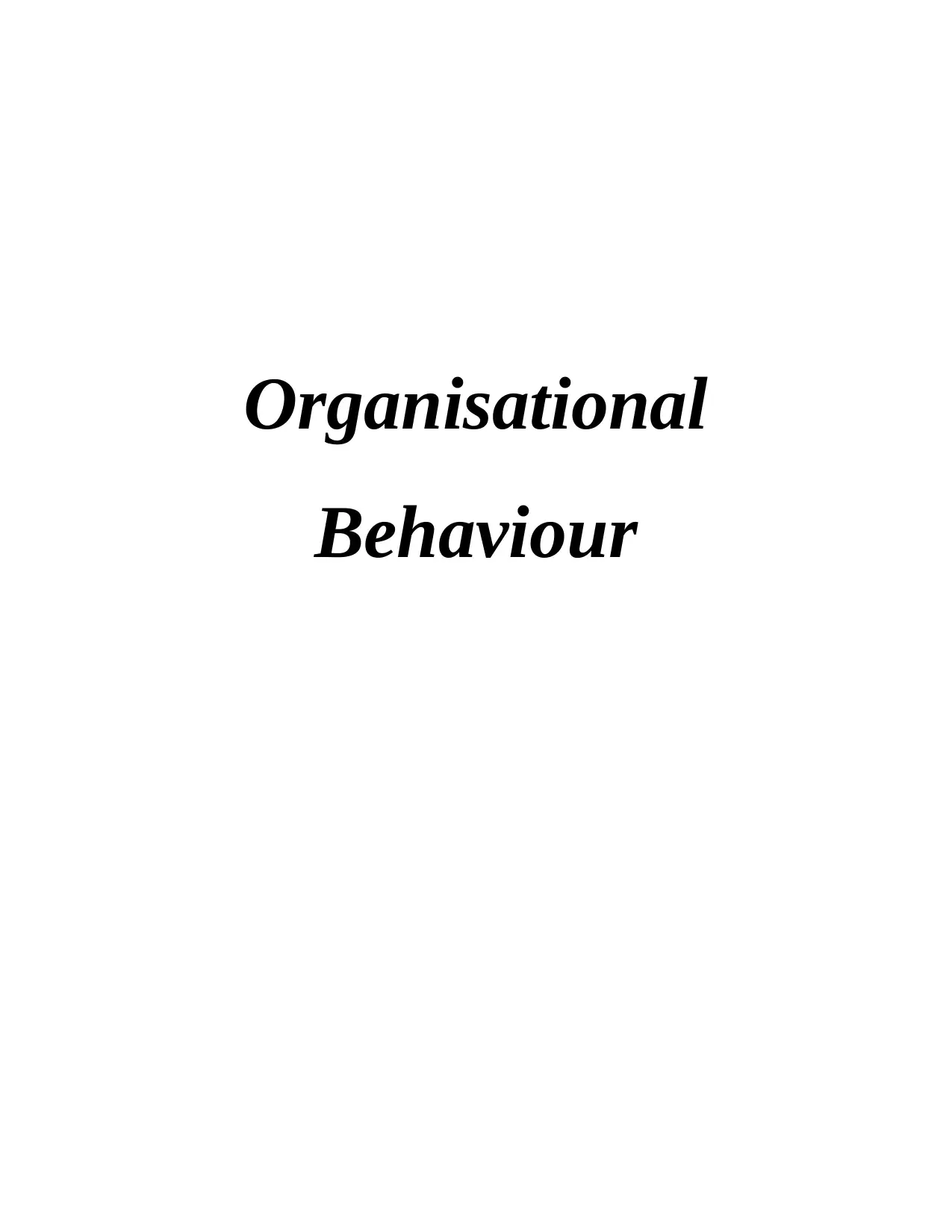
Organisational
Behaviour
Behaviour
Paraphrase This Document
Need a fresh take? Get an instant paraphrase of this document with our AI Paraphraser
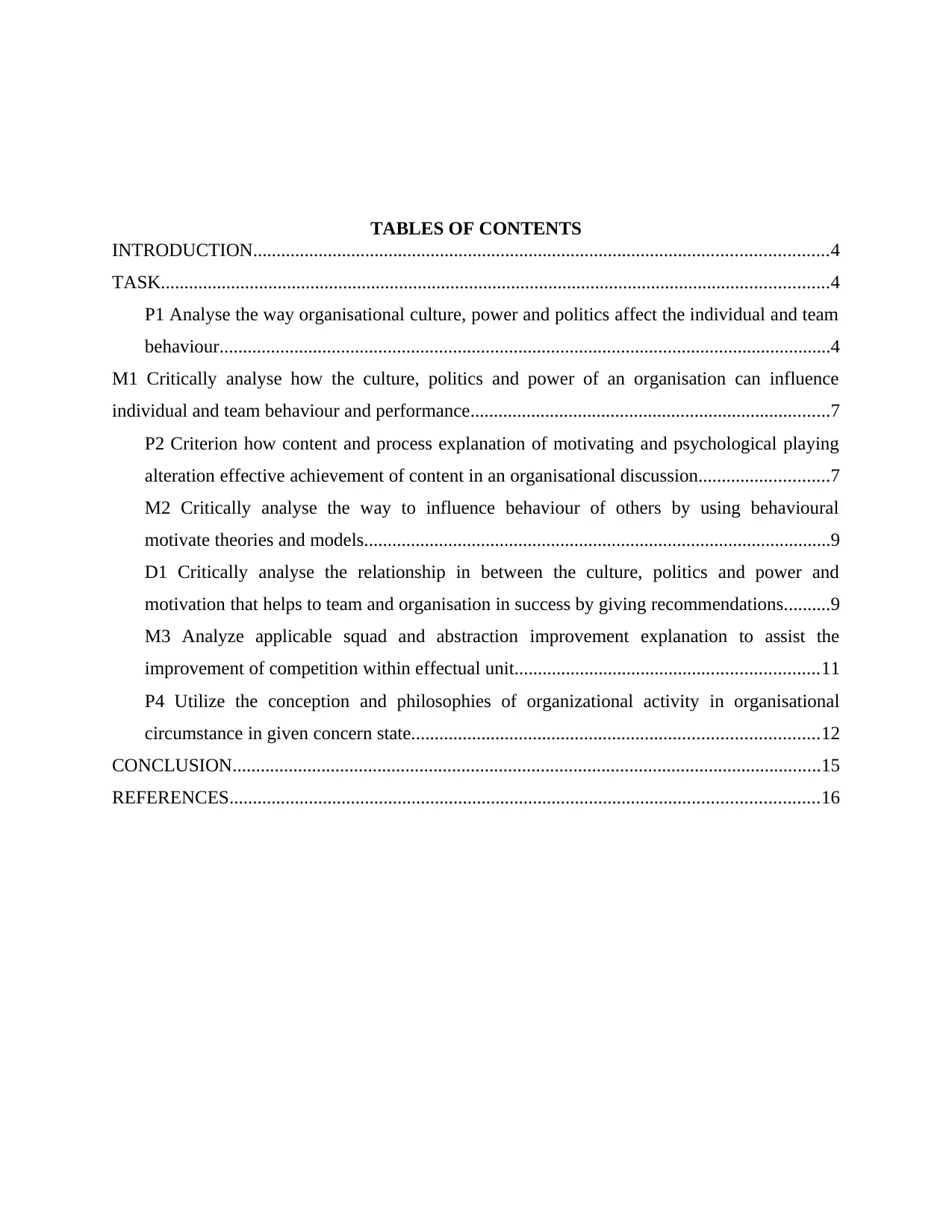
TABLES OF CONTENTS
INTRODUCTION...........................................................................................................................4
TASK...............................................................................................................................................4
P1 Analyse the way organisational culture, power and politics affect the individual and team
behaviour...................................................................................................................................4
M1 Critically analyse how the culture, politics and power of an organisation can influence
individual and team behaviour and performance.............................................................................7
P2 Criterion how content and process explanation of motivating and psychological playing
alteration effective achievement of content in an organisational discussion............................7
M2 Critically analyse the way to influence behaviour of others by using behavioural
motivate theories and models....................................................................................................9
D1 Critically analyse the relationship in between the culture, politics and power and
motivation that helps to team and organisation in success by giving recommendations..........9
M3 Analyze applicable squad and abstraction improvement explanation to assist the
improvement of competition within effectual unit.................................................................11
P4 Utilize the conception and philosophies of organizational activity in organisational
circumstance in given concern state.......................................................................................12
CONCLUSION..............................................................................................................................15
REFERENCES..............................................................................................................................16
INTRODUCTION...........................................................................................................................4
TASK...............................................................................................................................................4
P1 Analyse the way organisational culture, power and politics affect the individual and team
behaviour...................................................................................................................................4
M1 Critically analyse how the culture, politics and power of an organisation can influence
individual and team behaviour and performance.............................................................................7
P2 Criterion how content and process explanation of motivating and psychological playing
alteration effective achievement of content in an organisational discussion............................7
M2 Critically analyse the way to influence behaviour of others by using behavioural
motivate theories and models....................................................................................................9
D1 Critically analyse the relationship in between the culture, politics and power and
motivation that helps to team and organisation in success by giving recommendations..........9
M3 Analyze applicable squad and abstraction improvement explanation to assist the
improvement of competition within effectual unit.................................................................11
P4 Utilize the conception and philosophies of organizational activity in organisational
circumstance in given concern state.......................................................................................12
CONCLUSION..............................................................................................................................15
REFERENCES..............................................................................................................................16

⊘ This is a preview!⊘
Do you want full access?
Subscribe today to unlock all pages.

Trusted by 1+ million students worldwide
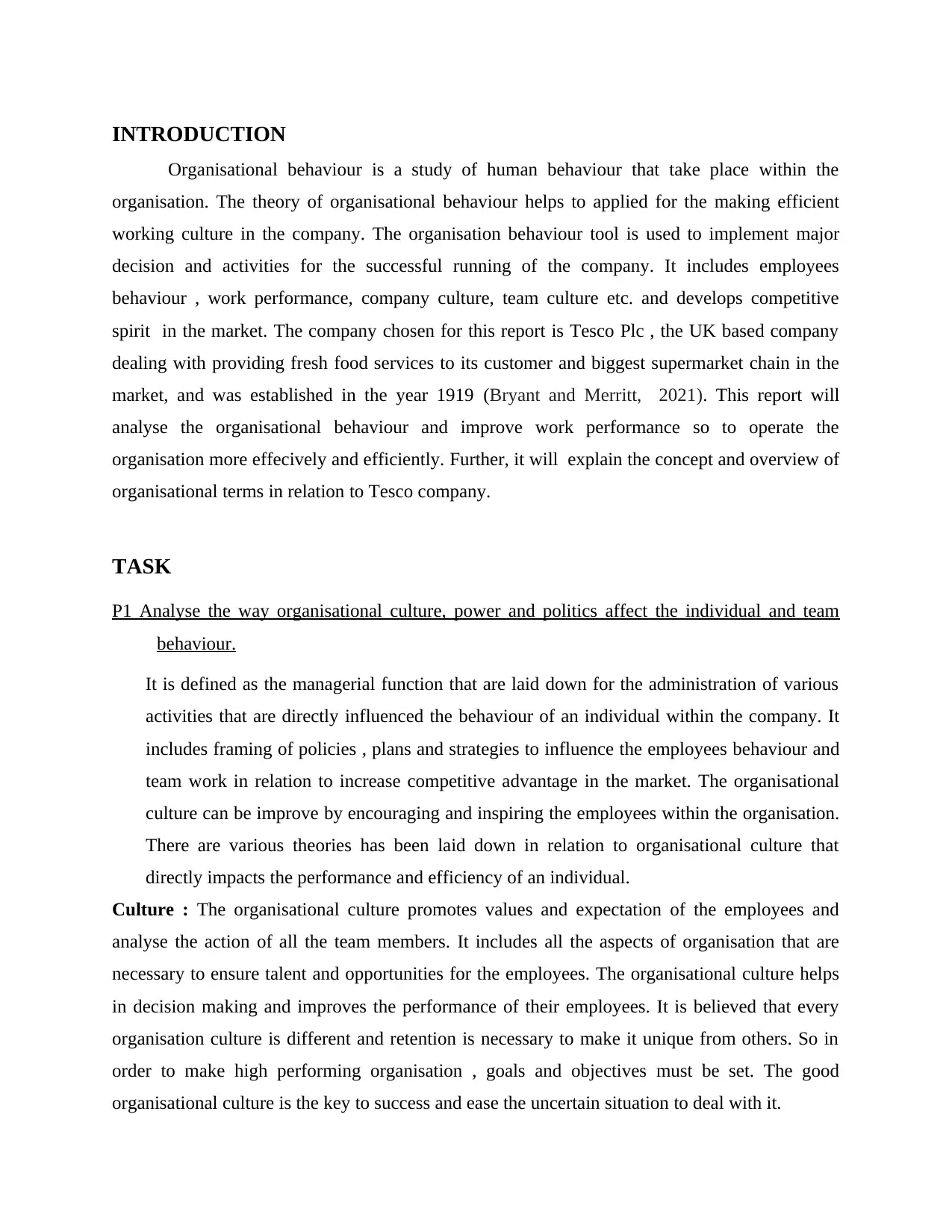
INTRODUCTION
Organisational behaviour is a study of human behaviour that take place within the
organisation. The theory of organisational behaviour helps to applied for the making efficient
working culture in the company. The organisation behaviour tool is used to implement major
decision and activities for the successful running of the company. It includes employees
behaviour , work performance, company culture, team culture etc. and develops competitive
spirit in the market. The company chosen for this report is Tesco Plc , the UK based company
dealing with providing fresh food services to its customer and biggest supermarket chain in the
market, and was established in the year 1919 (Bryant and Merritt, 2021). This report will
analyse the organisational behaviour and improve work performance so to operate the
organisation more effecively and efficiently. Further, it will explain the concept and overview of
organisational terms in relation to Tesco company.
TASK
P1 Analyse the way organisational culture, power and politics affect the individual and team
behaviour.
It is defined as the managerial function that are laid down for the administration of various
activities that are directly influenced the behaviour of an individual within the company. It
includes framing of policies , plans and strategies to influence the employees behaviour and
team work in relation to increase competitive advantage in the market. The organisational
culture can be improve by encouraging and inspiring the employees within the organisation.
There are various theories has been laid down in relation to organisational culture that
directly impacts the performance and efficiency of an individual.
Culture : The organisational culture promotes values and expectation of the employees and
analyse the action of all the team members. It includes all the aspects of organisation that are
necessary to ensure talent and opportunities for the employees. The organisational culture helps
in decision making and improves the performance of their employees. It is believed that every
organisation culture is different and retention is necessary to make it unique from others. So in
order to make high performing organisation , goals and objectives must be set. The good
organisational culture is the key to success and ease the uncertain situation to deal with it.
Organisational behaviour is a study of human behaviour that take place within the
organisation. The theory of organisational behaviour helps to applied for the making efficient
working culture in the company. The organisation behaviour tool is used to implement major
decision and activities for the successful running of the company. It includes employees
behaviour , work performance, company culture, team culture etc. and develops competitive
spirit in the market. The company chosen for this report is Tesco Plc , the UK based company
dealing with providing fresh food services to its customer and biggest supermarket chain in the
market, and was established in the year 1919 (Bryant and Merritt, 2021). This report will
analyse the organisational behaviour and improve work performance so to operate the
organisation more effecively and efficiently. Further, it will explain the concept and overview of
organisational terms in relation to Tesco company.
TASK
P1 Analyse the way organisational culture, power and politics affect the individual and team
behaviour.
It is defined as the managerial function that are laid down for the administration of various
activities that are directly influenced the behaviour of an individual within the company. It
includes framing of policies , plans and strategies to influence the employees behaviour and
team work in relation to increase competitive advantage in the market. The organisational
culture can be improve by encouraging and inspiring the employees within the organisation.
There are various theories has been laid down in relation to organisational culture that
directly impacts the performance and efficiency of an individual.
Culture : The organisational culture promotes values and expectation of the employees and
analyse the action of all the team members. It includes all the aspects of organisation that are
necessary to ensure talent and opportunities for the employees. The organisational culture helps
in decision making and improves the performance of their employees. It is believed that every
organisation culture is different and retention is necessary to make it unique from others. So in
order to make high performing organisation , goals and objectives must be set. The good
organisational culture is the key to success and ease the uncertain situation to deal with it.
Paraphrase This Document
Need a fresh take? Get an instant paraphrase of this document with our AI Paraphraser
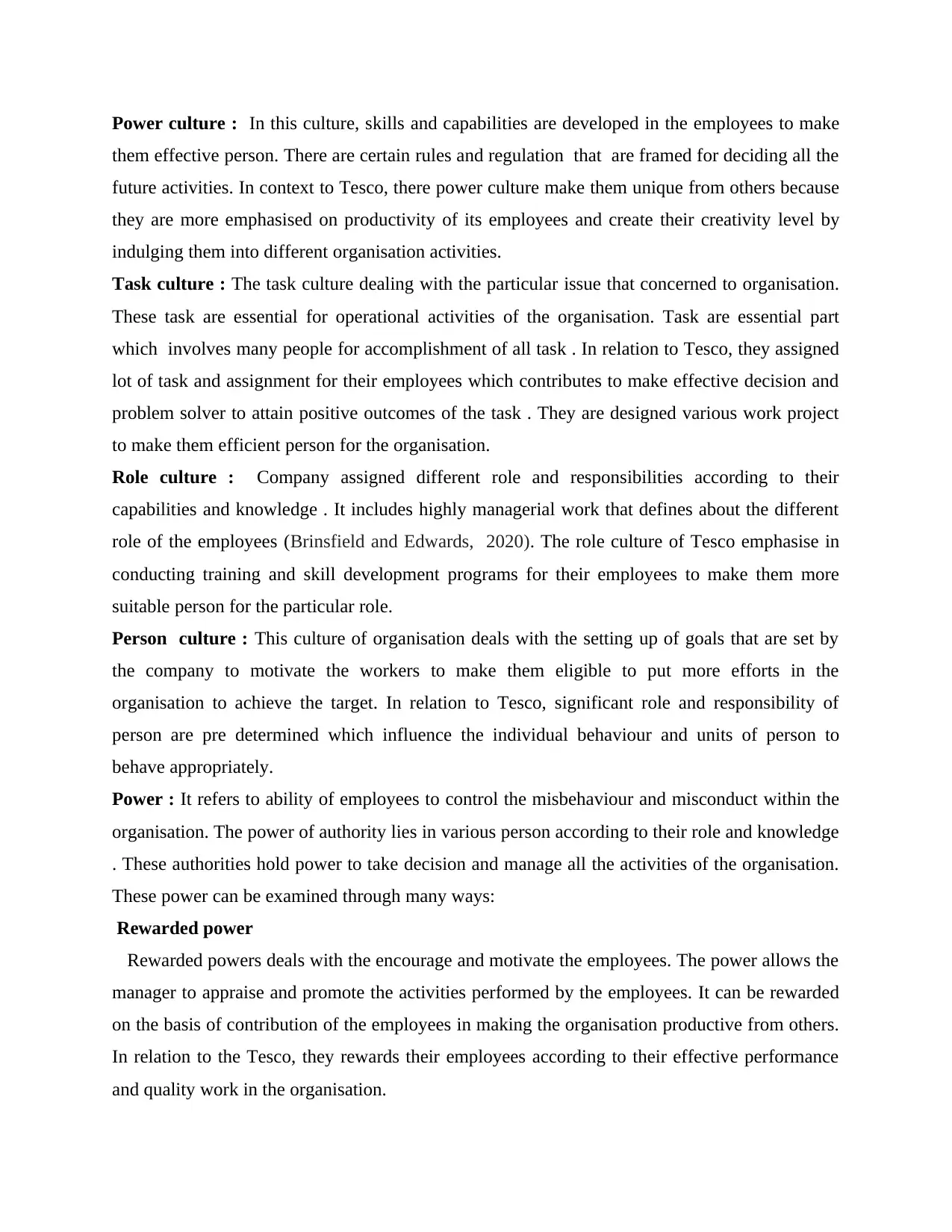
Power culture : In this culture, skills and capabilities are developed in the employees to make
them effective person. There are certain rules and regulation that are framed for deciding all the
future activities. In context to Tesco, there power culture make them unique from others because
they are more emphasised on productivity of its employees and create their creativity level by
indulging them into different organisation activities.
Task culture : The task culture dealing with the particular issue that concerned to organisation.
These task are essential for operational activities of the organisation. Task are essential part
which involves many people for accomplishment of all task . In relation to Tesco, they assigned
lot of task and assignment for their employees which contributes to make effective decision and
problem solver to attain positive outcomes of the task . They are designed various work project
to make them efficient person for the organisation.
Role culture : Company assigned different role and responsibilities according to their
capabilities and knowledge . It includes highly managerial work that defines about the different
role of the employees (Brinsfield and Edwards, 2020). The role culture of Tesco emphasise in
conducting training and skill development programs for their employees to make them more
suitable person for the particular role.
Person culture : This culture of organisation deals with the setting up of goals that are set by
the company to motivate the workers to make them eligible to put more efforts in the
organisation to achieve the target. In relation to Tesco, significant role and responsibility of
person are pre determined which influence the individual behaviour and units of person to
behave appropriately.
Power : It refers to ability of employees to control the misbehaviour and misconduct within the
organisation. The power of authority lies in various person according to their role and knowledge
. These authorities hold power to take decision and manage all the activities of the organisation.
These power can be examined through many ways:
Rewarded power
Rewarded powers deals with the encourage and motivate the employees. The power allows the
manager to appraise and promote the activities performed by the employees. It can be rewarded
on the basis of contribution of the employees in making the organisation productive from others.
In relation to the Tesco, they rewards their employees according to their effective performance
and quality work in the organisation.
them effective person. There are certain rules and regulation that are framed for deciding all the
future activities. In context to Tesco, there power culture make them unique from others because
they are more emphasised on productivity of its employees and create their creativity level by
indulging them into different organisation activities.
Task culture : The task culture dealing with the particular issue that concerned to organisation.
These task are essential for operational activities of the organisation. Task are essential part
which involves many people for accomplishment of all task . In relation to Tesco, they assigned
lot of task and assignment for their employees which contributes to make effective decision and
problem solver to attain positive outcomes of the task . They are designed various work project
to make them efficient person for the organisation.
Role culture : Company assigned different role and responsibilities according to their
capabilities and knowledge . It includes highly managerial work that defines about the different
role of the employees (Brinsfield and Edwards, 2020). The role culture of Tesco emphasise in
conducting training and skill development programs for their employees to make them more
suitable person for the particular role.
Person culture : This culture of organisation deals with the setting up of goals that are set by
the company to motivate the workers to make them eligible to put more efforts in the
organisation to achieve the target. In relation to Tesco, significant role and responsibility of
person are pre determined which influence the individual behaviour and units of person to
behave appropriately.
Power : It refers to ability of employees to control the misbehaviour and misconduct within the
organisation. The power of authority lies in various person according to their role and knowledge
. These authorities hold power to take decision and manage all the activities of the organisation.
These power can be examined through many ways:
Rewarded power
Rewarded powers deals with the encourage and motivate the employees. The power allows the
manager to appraise and promote the activities performed by the employees. It can be rewarded
on the basis of contribution of the employees in making the organisation productive from others.
In relation to the Tesco, they rewards their employees according to their effective performance
and quality work in the organisation.
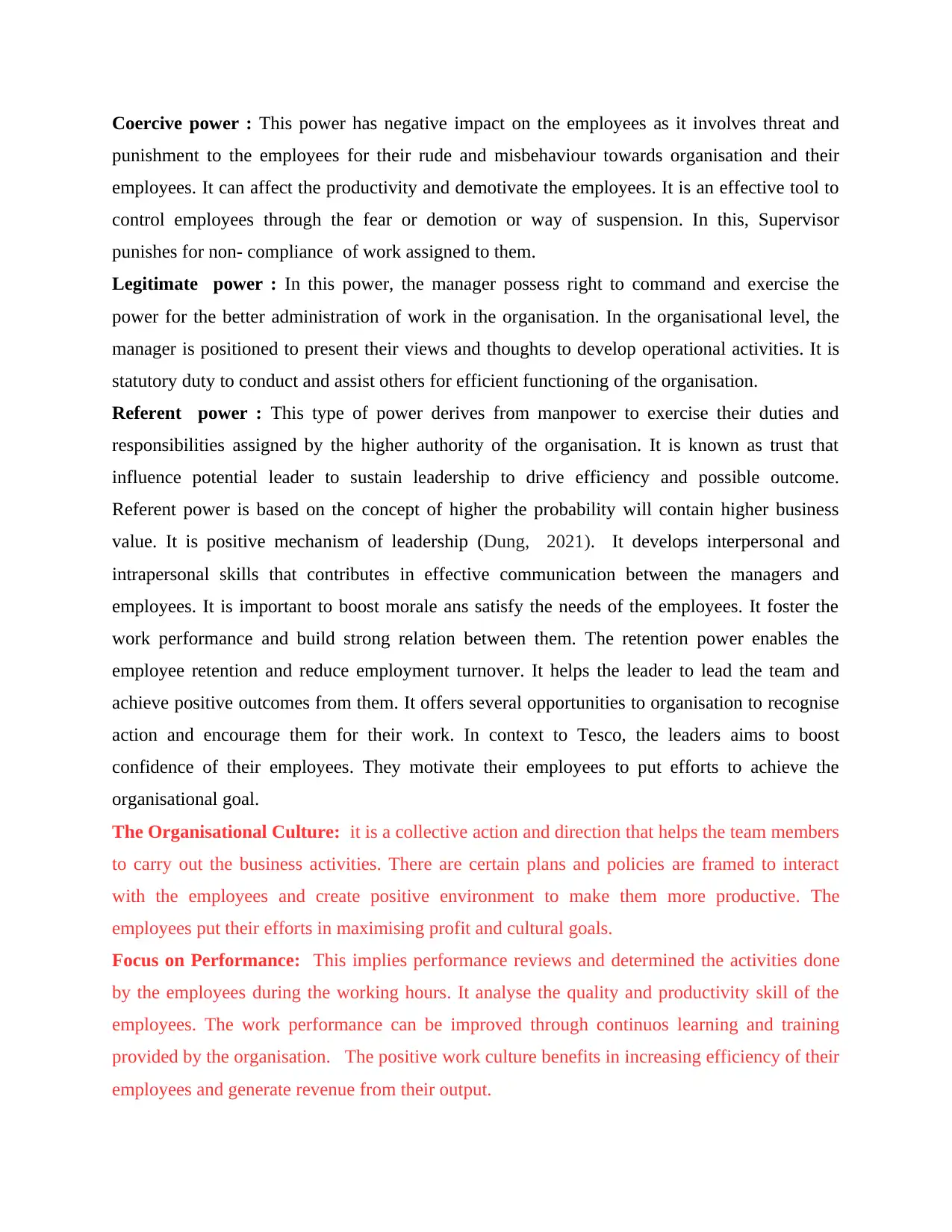
Coercive power : This power has negative impact on the employees as it involves threat and
punishment to the employees for their rude and misbehaviour towards organisation and their
employees. It can affect the productivity and demotivate the employees. It is an effective tool to
control employees through the fear or demotion or way of suspension. In this, Supervisor
punishes for non- compliance of work assigned to them.
Legitimate power : In this power, the manager possess right to command and exercise the
power for the better administration of work in the organisation. In the organisational level, the
manager is positioned to present their views and thoughts to develop operational activities. It is
statutory duty to conduct and assist others for efficient functioning of the organisation.
Referent power : This type of power derives from manpower to exercise their duties and
responsibilities assigned by the higher authority of the organisation. It is known as trust that
influence potential leader to sustain leadership to drive efficiency and possible outcome.
Referent power is based on the concept of higher the probability will contain higher business
value. It is positive mechanism of leadership (Dung, 2021). It develops interpersonal and
intrapersonal skills that contributes in effective communication between the managers and
employees. It is important to boost morale ans satisfy the needs of the employees. It foster the
work performance and build strong relation between them. The retention power enables the
employee retention and reduce employment turnover. It helps the leader to lead the team and
achieve positive outcomes from them. It offers several opportunities to organisation to recognise
action and encourage them for their work. In context to Tesco, the leaders aims to boost
confidence of their employees. They motivate their employees to put efforts to achieve the
organisational goal.
The Organisational Culture: it is a collective action and direction that helps the team members
to carry out the business activities. There are certain plans and policies are framed to interact
with the employees and create positive environment to make them more productive. The
employees put their efforts in maximising profit and cultural goals.
Focus on Performance: This implies performance reviews and determined the activities done
by the employees during the working hours. It analyse the quality and productivity skill of the
employees. The work performance can be improved through continuos learning and training
provided by the organisation. The positive work culture benefits in increasing efficiency of their
employees and generate revenue from their output.
punishment to the employees for their rude and misbehaviour towards organisation and their
employees. It can affect the productivity and demotivate the employees. It is an effective tool to
control employees through the fear or demotion or way of suspension. In this, Supervisor
punishes for non- compliance of work assigned to them.
Legitimate power : In this power, the manager possess right to command and exercise the
power for the better administration of work in the organisation. In the organisational level, the
manager is positioned to present their views and thoughts to develop operational activities. It is
statutory duty to conduct and assist others for efficient functioning of the organisation.
Referent power : This type of power derives from manpower to exercise their duties and
responsibilities assigned by the higher authority of the organisation. It is known as trust that
influence potential leader to sustain leadership to drive efficiency and possible outcome.
Referent power is based on the concept of higher the probability will contain higher business
value. It is positive mechanism of leadership (Dung, 2021). It develops interpersonal and
intrapersonal skills that contributes in effective communication between the managers and
employees. It is important to boost morale ans satisfy the needs of the employees. It foster the
work performance and build strong relation between them. The retention power enables the
employee retention and reduce employment turnover. It helps the leader to lead the team and
achieve positive outcomes from them. It offers several opportunities to organisation to recognise
action and encourage them for their work. In context to Tesco, the leaders aims to boost
confidence of their employees. They motivate their employees to put efforts to achieve the
organisational goal.
The Organisational Culture: it is a collective action and direction that helps the team members
to carry out the business activities. There are certain plans and policies are framed to interact
with the employees and create positive environment to make them more productive. The
employees put their efforts in maximising profit and cultural goals.
Focus on Performance: This implies performance reviews and determined the activities done
by the employees during the working hours. It analyse the quality and productivity skill of the
employees. The work performance can be improved through continuos learning and training
provided by the organisation. The positive work culture benefits in increasing efficiency of their
employees and generate revenue from their output.
⊘ This is a preview!⊘
Do you want full access?
Subscribe today to unlock all pages.

Trusted by 1+ million students worldwide
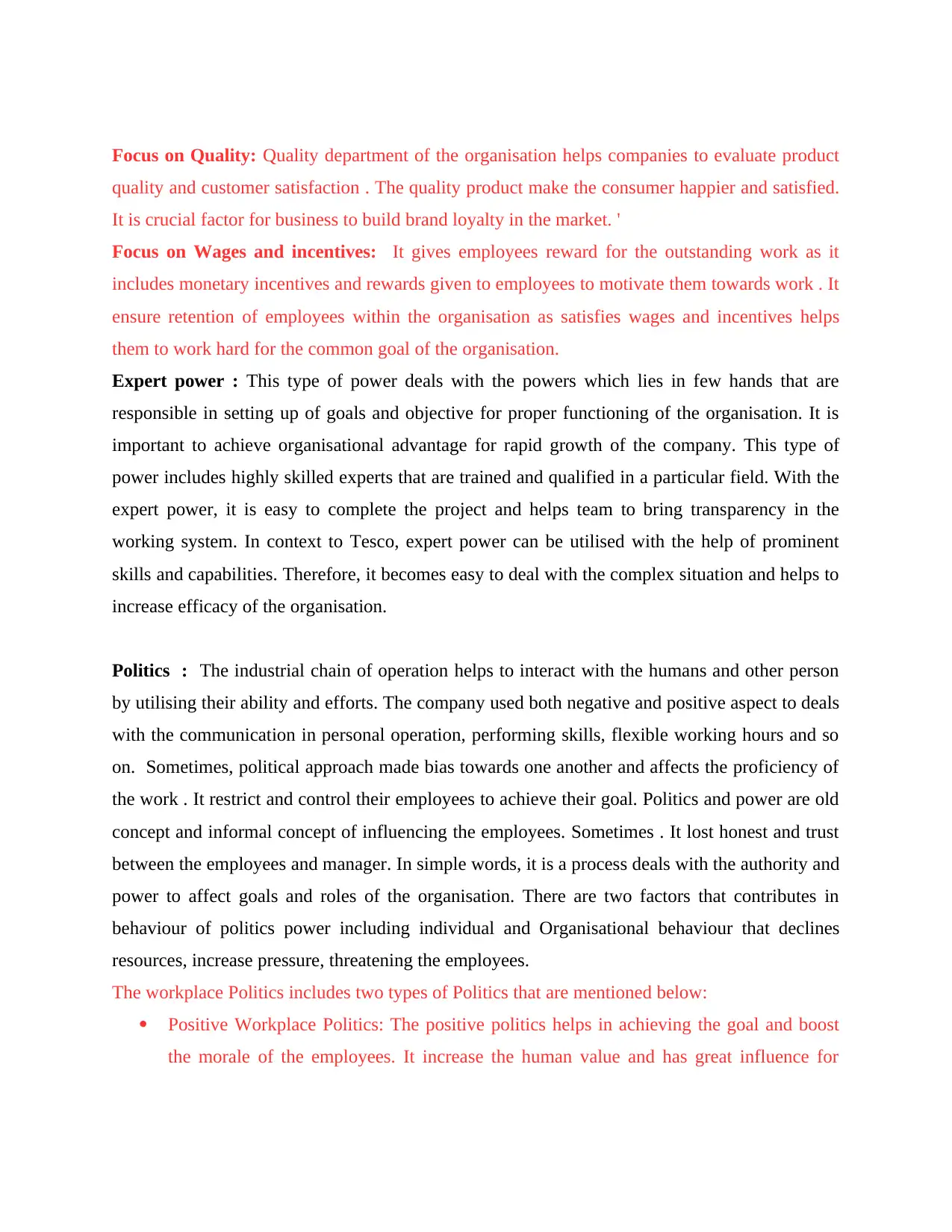
Focus on Quality: Quality department of the organisation helps companies to evaluate product
quality and customer satisfaction . The quality product make the consumer happier and satisfied.
It is crucial factor for business to build brand loyalty in the market. '
Focus on Wages and incentives: It gives employees reward for the outstanding work as it
includes monetary incentives and rewards given to employees to motivate them towards work . It
ensure retention of employees within the organisation as satisfies wages and incentives helps
them to work hard for the common goal of the organisation.
Expert power : This type of power deals with the powers which lies in few hands that are
responsible in setting up of goals and objective for proper functioning of the organisation. It is
important to achieve organisational advantage for rapid growth of the company. This type of
power includes highly skilled experts that are trained and qualified in a particular field. With the
expert power, it is easy to complete the project and helps team to bring transparency in the
working system. In context to Tesco, expert power can be utilised with the help of prominent
skills and capabilities. Therefore, it becomes easy to deal with the complex situation and helps to
increase efficacy of the organisation.
Politics : The industrial chain of operation helps to interact with the humans and other person
by utilising their ability and efforts. The company used both negative and positive aspect to deals
with the communication in personal operation, performing skills, flexible working hours and so
on. Sometimes, political approach made bias towards one another and affects the proficiency of
the work . It restrict and control their employees to achieve their goal. Politics and power are old
concept and informal concept of influencing the employees. Sometimes . It lost honest and trust
between the employees and manager. In simple words, it is a process deals with the authority and
power to affect goals and roles of the organisation. There are two factors that contributes in
behaviour of politics power including individual and Organisational behaviour that declines
resources, increase pressure, threatening the employees.
The workplace Politics includes two types of Politics that are mentioned below:
Positive Workplace Politics: The positive politics helps in achieving the goal and boost
the morale of the employees. It increase the human value and has great influence for
quality and customer satisfaction . The quality product make the consumer happier and satisfied.
It is crucial factor for business to build brand loyalty in the market. '
Focus on Wages and incentives: It gives employees reward for the outstanding work as it
includes monetary incentives and rewards given to employees to motivate them towards work . It
ensure retention of employees within the organisation as satisfies wages and incentives helps
them to work hard for the common goal of the organisation.
Expert power : This type of power deals with the powers which lies in few hands that are
responsible in setting up of goals and objective for proper functioning of the organisation. It is
important to achieve organisational advantage for rapid growth of the company. This type of
power includes highly skilled experts that are trained and qualified in a particular field. With the
expert power, it is easy to complete the project and helps team to bring transparency in the
working system. In context to Tesco, expert power can be utilised with the help of prominent
skills and capabilities. Therefore, it becomes easy to deal with the complex situation and helps to
increase efficacy of the organisation.
Politics : The industrial chain of operation helps to interact with the humans and other person
by utilising their ability and efforts. The company used both negative and positive aspect to deals
with the communication in personal operation, performing skills, flexible working hours and so
on. Sometimes, political approach made bias towards one another and affects the proficiency of
the work . It restrict and control their employees to achieve their goal. Politics and power are old
concept and informal concept of influencing the employees. Sometimes . It lost honest and trust
between the employees and manager. In simple words, it is a process deals with the authority and
power to affect goals and roles of the organisation. There are two factors that contributes in
behaviour of politics power including individual and Organisational behaviour that declines
resources, increase pressure, threatening the employees.
The workplace Politics includes two types of Politics that are mentioned below:
Positive Workplace Politics: The positive politics helps in achieving the goal and boost
the morale of the employees. It increase the human value and has great influence for
Paraphrase This Document
Need a fresh take? Get an instant paraphrase of this document with our AI Paraphraser
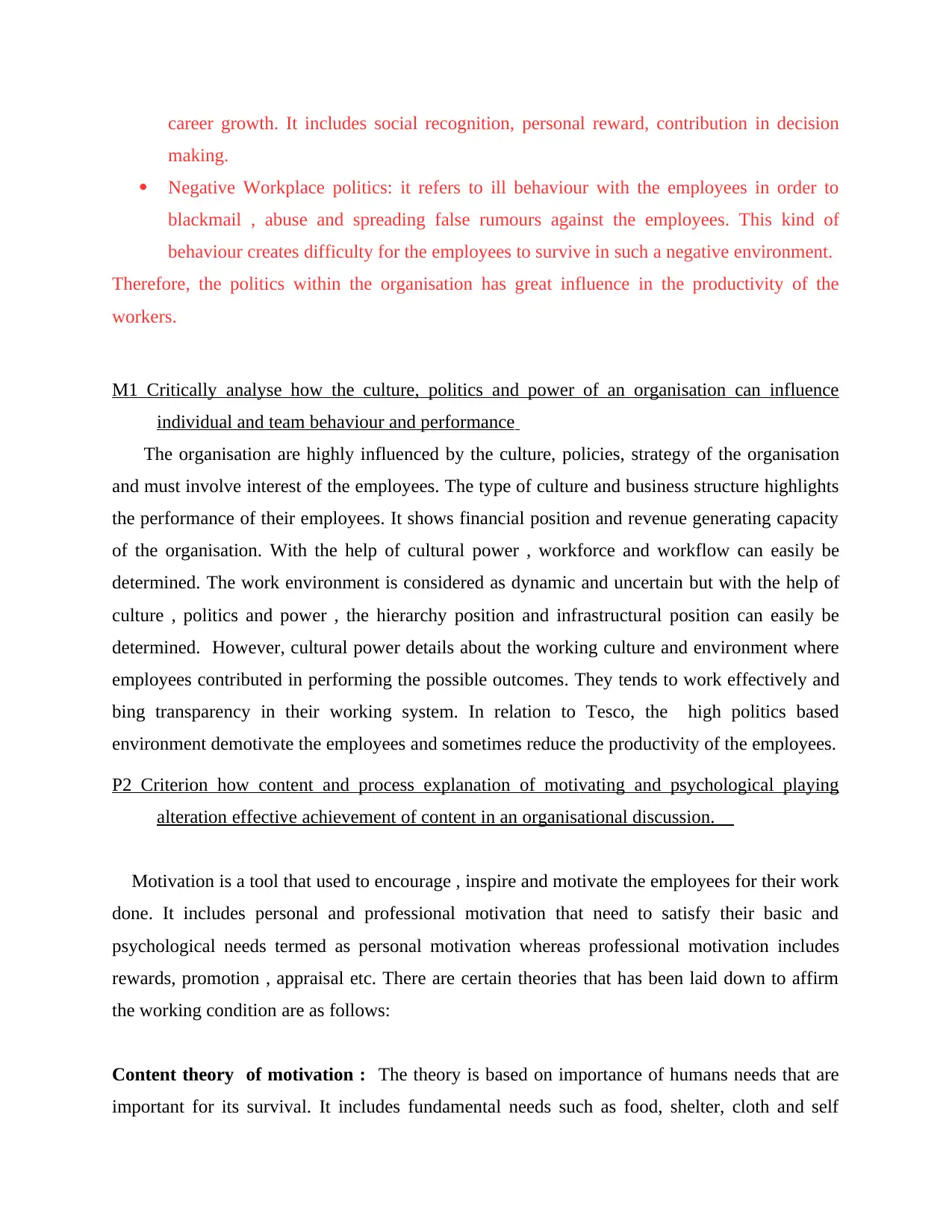
career growth. It includes social recognition, personal reward, contribution in decision
making.
Negative Workplace politics: it refers to ill behaviour with the employees in order to
blackmail , abuse and spreading false rumours against the employees. This kind of
behaviour creates difficulty for the employees to survive in such a negative environment.
Therefore, the politics within the organisation has great influence in the productivity of the
workers.
M1 Critically analyse how the culture, politics and power of an organisation can influence
individual and team behaviour and performance
The organisation are highly influenced by the culture, policies, strategy of the organisation
and must involve interest of the employees. The type of culture and business structure highlights
the performance of their employees. It shows financial position and revenue generating capacity
of the organisation. With the help of cultural power , workforce and workflow can easily be
determined. The work environment is considered as dynamic and uncertain but with the help of
culture , politics and power , the hierarchy position and infrastructural position can easily be
determined. However, cultural power details about the working culture and environment where
employees contributed in performing the possible outcomes. They tends to work effectively and
bing transparency in their working system. In relation to Tesco, the high politics based
environment demotivate the employees and sometimes reduce the productivity of the employees.
P2 Criterion how content and process explanation of motivating and psychological playing
alteration effective achievement of content in an organisational discussion.
Motivation is a tool that used to encourage , inspire and motivate the employees for their work
done. It includes personal and professional motivation that need to satisfy their basic and
psychological needs termed as personal motivation whereas professional motivation includes
rewards, promotion , appraisal etc. There are certain theories that has been laid down to affirm
the working condition are as follows:
Content theory of motivation : The theory is based on importance of humans needs that are
important for its survival. It includes fundamental needs such as food, shelter, cloth and self
making.
Negative Workplace politics: it refers to ill behaviour with the employees in order to
blackmail , abuse and spreading false rumours against the employees. This kind of
behaviour creates difficulty for the employees to survive in such a negative environment.
Therefore, the politics within the organisation has great influence in the productivity of the
workers.
M1 Critically analyse how the culture, politics and power of an organisation can influence
individual and team behaviour and performance
The organisation are highly influenced by the culture, policies, strategy of the organisation
and must involve interest of the employees. The type of culture and business structure highlights
the performance of their employees. It shows financial position and revenue generating capacity
of the organisation. With the help of cultural power , workforce and workflow can easily be
determined. The work environment is considered as dynamic and uncertain but with the help of
culture , politics and power , the hierarchy position and infrastructural position can easily be
determined. However, cultural power details about the working culture and environment where
employees contributed in performing the possible outcomes. They tends to work effectively and
bing transparency in their working system. In relation to Tesco, the high politics based
environment demotivate the employees and sometimes reduce the productivity of the employees.
P2 Criterion how content and process explanation of motivating and psychological playing
alteration effective achievement of content in an organisational discussion.
Motivation is a tool that used to encourage , inspire and motivate the employees for their work
done. It includes personal and professional motivation that need to satisfy their basic and
psychological needs termed as personal motivation whereas professional motivation includes
rewards, promotion , appraisal etc. There are certain theories that has been laid down to affirm
the working condition are as follows:
Content theory of motivation : The theory is based on importance of humans needs that are
important for its survival. It includes fundamental needs such as food, shelter, cloth and self
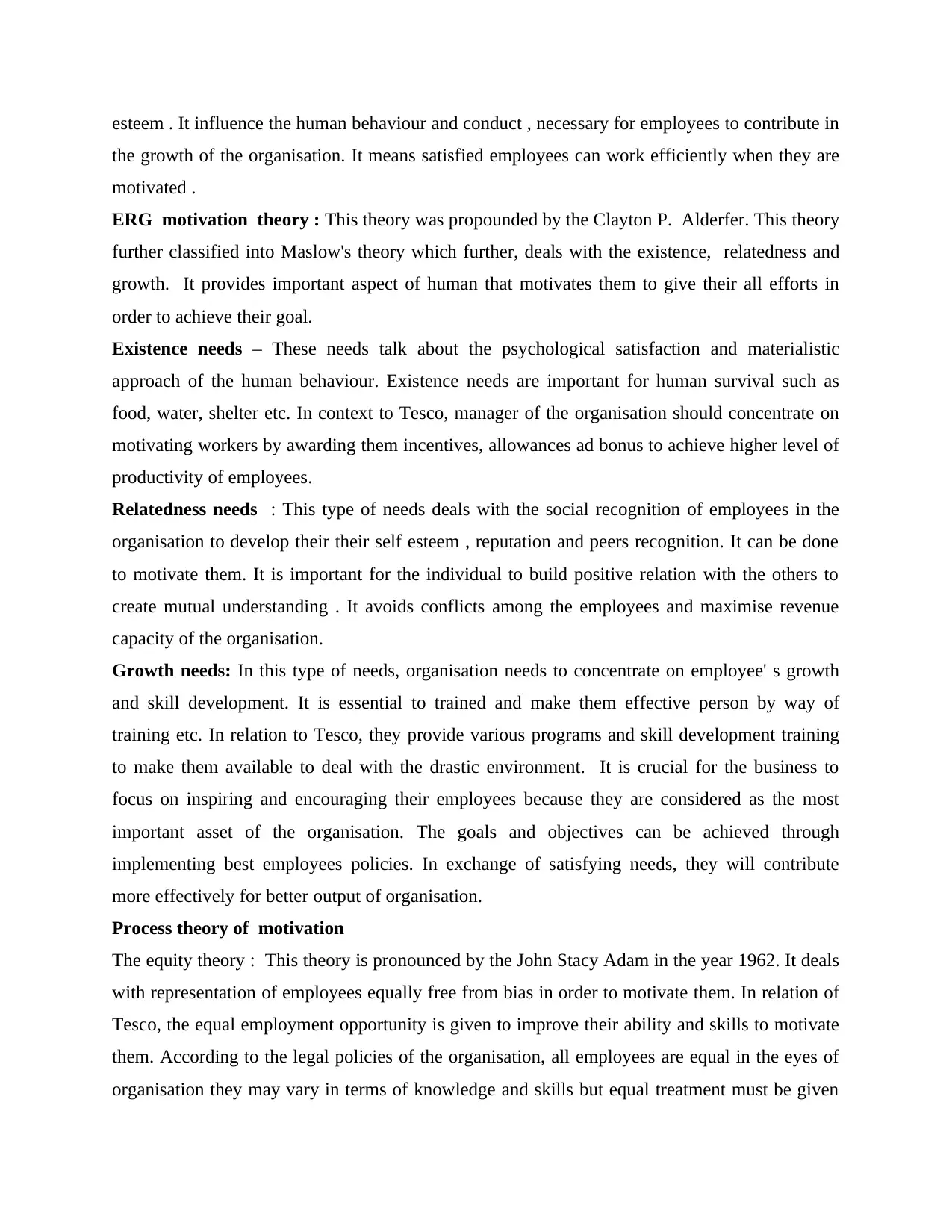
esteem . It influence the human behaviour and conduct , necessary for employees to contribute in
the growth of the organisation. It means satisfied employees can work efficiently when they are
motivated .
ERG motivation theory : This theory was propounded by the Clayton P. Alderfer. This theory
further classified into Maslow's theory which further, deals with the existence, relatedness and
growth. It provides important aspect of human that motivates them to give their all efforts in
order to achieve their goal.
Existence needs – These needs talk about the psychological satisfaction and materialistic
approach of the human behaviour. Existence needs are important for human survival such as
food, water, shelter etc. In context to Tesco, manager of the organisation should concentrate on
motivating workers by awarding them incentives, allowances ad bonus to achieve higher level of
productivity of employees.
Relatedness needs : This type of needs deals with the social recognition of employees in the
organisation to develop their their self esteem , reputation and peers recognition. It can be done
to motivate them. It is important for the individual to build positive relation with the others to
create mutual understanding . It avoids conflicts among the employees and maximise revenue
capacity of the organisation.
Growth needs: In this type of needs, organisation needs to concentrate on employee' s growth
and skill development. It is essential to trained and make them effective person by way of
training etc. In relation to Tesco, they provide various programs and skill development training
to make them available to deal with the drastic environment. It is crucial for the business to
focus on inspiring and encouraging their employees because they are considered as the most
important asset of the organisation. The goals and objectives can be achieved through
implementing best employees policies. In exchange of satisfying needs, they will contribute
more effectively for better output of organisation.
Process theory of motivation
The equity theory : This theory is pronounced by the John Stacy Adam in the year 1962. It deals
with representation of employees equally free from bias in order to motivate them. In relation of
Tesco, the equal employment opportunity is given to improve their ability and skills to motivate
them. According to the legal policies of the organisation, all employees are equal in the eyes of
organisation they may vary in terms of knowledge and skills but equal treatment must be given
the growth of the organisation. It means satisfied employees can work efficiently when they are
motivated .
ERG motivation theory : This theory was propounded by the Clayton P. Alderfer. This theory
further classified into Maslow's theory which further, deals with the existence, relatedness and
growth. It provides important aspect of human that motivates them to give their all efforts in
order to achieve their goal.
Existence needs – These needs talk about the psychological satisfaction and materialistic
approach of the human behaviour. Existence needs are important for human survival such as
food, water, shelter etc. In context to Tesco, manager of the organisation should concentrate on
motivating workers by awarding them incentives, allowances ad bonus to achieve higher level of
productivity of employees.
Relatedness needs : This type of needs deals with the social recognition of employees in the
organisation to develop their their self esteem , reputation and peers recognition. It can be done
to motivate them. It is important for the individual to build positive relation with the others to
create mutual understanding . It avoids conflicts among the employees and maximise revenue
capacity of the organisation.
Growth needs: In this type of needs, organisation needs to concentrate on employee' s growth
and skill development. It is essential to trained and make them effective person by way of
training etc. In relation to Tesco, they provide various programs and skill development training
to make them available to deal with the drastic environment. It is crucial for the business to
focus on inspiring and encouraging their employees because they are considered as the most
important asset of the organisation. The goals and objectives can be achieved through
implementing best employees policies. In exchange of satisfying needs, they will contribute
more effectively for better output of organisation.
Process theory of motivation
The equity theory : This theory is pronounced by the John Stacy Adam in the year 1962. It deals
with representation of employees equally free from bias in order to motivate them. In relation of
Tesco, the equal employment opportunity is given to improve their ability and skills to motivate
them. According to the legal policies of the organisation, all employees are equal in the eyes of
organisation they may vary in terms of knowledge and skills but equal treatment must be given
⊘ This is a preview!⊘
Do you want full access?
Subscribe today to unlock all pages.

Trusted by 1+ million students worldwide
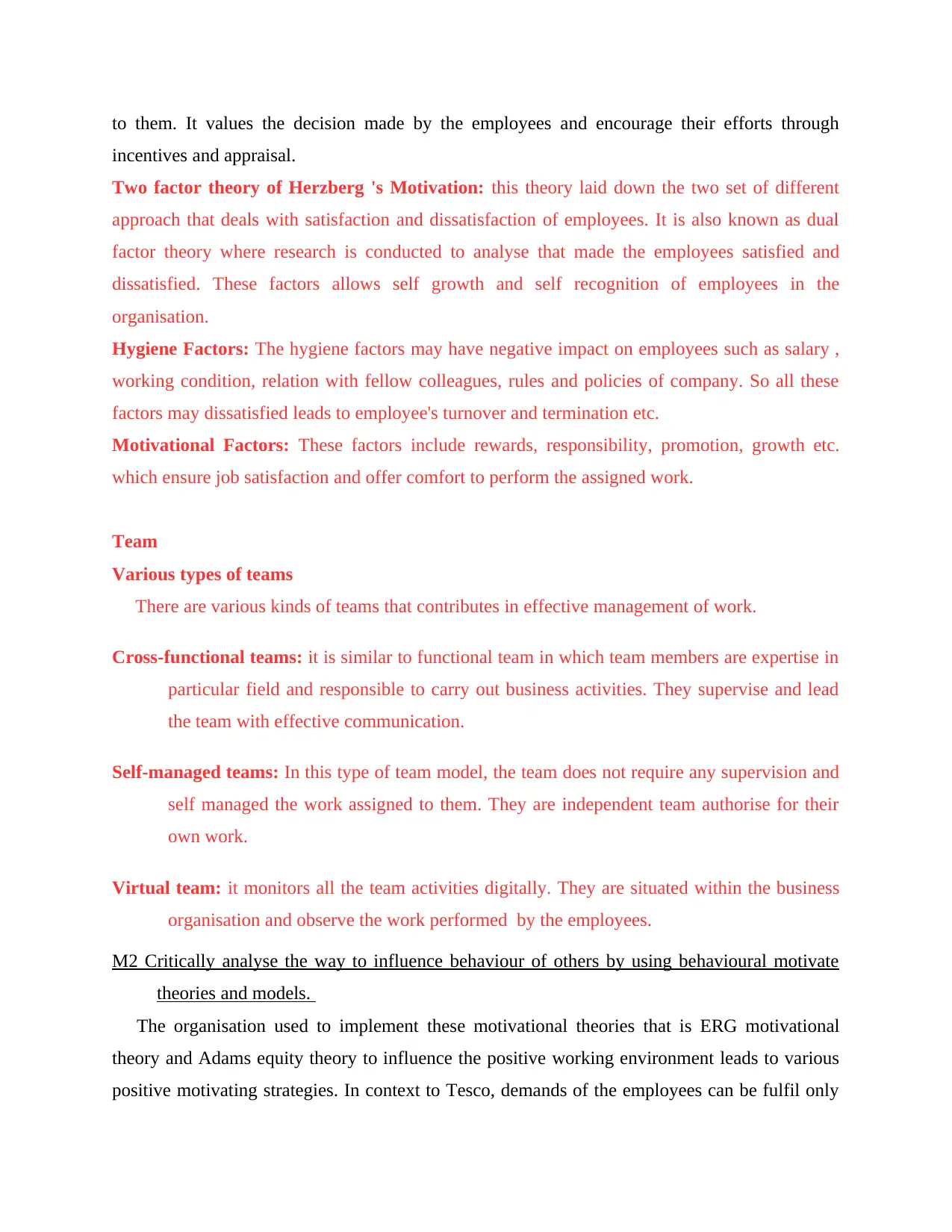
to them. It values the decision made by the employees and encourage their efforts through
incentives and appraisal.
Two factor theory of Herzberg 's Motivation: this theory laid down the two set of different
approach that deals with satisfaction and dissatisfaction of employees. It is also known as dual
factor theory where research is conducted to analyse that made the employees satisfied and
dissatisfied. These factors allows self growth and self recognition of employees in the
organisation.
Hygiene Factors: The hygiene factors may have negative impact on employees such as salary ,
working condition, relation with fellow colleagues, rules and policies of company. So all these
factors may dissatisfied leads to employee's turnover and termination etc.
Motivational Factors: These factors include rewards, responsibility, promotion, growth etc.
which ensure job satisfaction and offer comfort to perform the assigned work.
Team
Various types of teams
There are various kinds of teams that contributes in effective management of work.
Cross-functional teams: it is similar to functional team in which team members are expertise in
particular field and responsible to carry out business activities. They supervise and lead
the team with effective communication.
Self-managed teams: In this type of team model, the team does not require any supervision and
self managed the work assigned to them. They are independent team authorise for their
own work.
Virtual team: it monitors all the team activities digitally. They are situated within the business
organisation and observe the work performed by the employees.
M2 Critically analyse the way to influence behaviour of others by using behavioural motivate
theories and models.
The organisation used to implement these motivational theories that is ERG motivational
theory and Adams equity theory to influence the positive working environment leads to various
positive motivating strategies. In context to Tesco, demands of the employees can be fulfil only
incentives and appraisal.
Two factor theory of Herzberg 's Motivation: this theory laid down the two set of different
approach that deals with satisfaction and dissatisfaction of employees. It is also known as dual
factor theory where research is conducted to analyse that made the employees satisfied and
dissatisfied. These factors allows self growth and self recognition of employees in the
organisation.
Hygiene Factors: The hygiene factors may have negative impact on employees such as salary ,
working condition, relation with fellow colleagues, rules and policies of company. So all these
factors may dissatisfied leads to employee's turnover and termination etc.
Motivational Factors: These factors include rewards, responsibility, promotion, growth etc.
which ensure job satisfaction and offer comfort to perform the assigned work.
Team
Various types of teams
There are various kinds of teams that contributes in effective management of work.
Cross-functional teams: it is similar to functional team in which team members are expertise in
particular field and responsible to carry out business activities. They supervise and lead
the team with effective communication.
Self-managed teams: In this type of team model, the team does not require any supervision and
self managed the work assigned to them. They are independent team authorise for their
own work.
Virtual team: it monitors all the team activities digitally. They are situated within the business
organisation and observe the work performed by the employees.
M2 Critically analyse the way to influence behaviour of others by using behavioural motivate
theories and models.
The organisation used to implement these motivational theories that is ERG motivational
theory and Adams equity theory to influence the positive working environment leads to various
positive motivating strategies. In context to Tesco, demands of the employees can be fulfil only
Paraphrase This Document
Need a fresh take? Get an instant paraphrase of this document with our AI Paraphraser
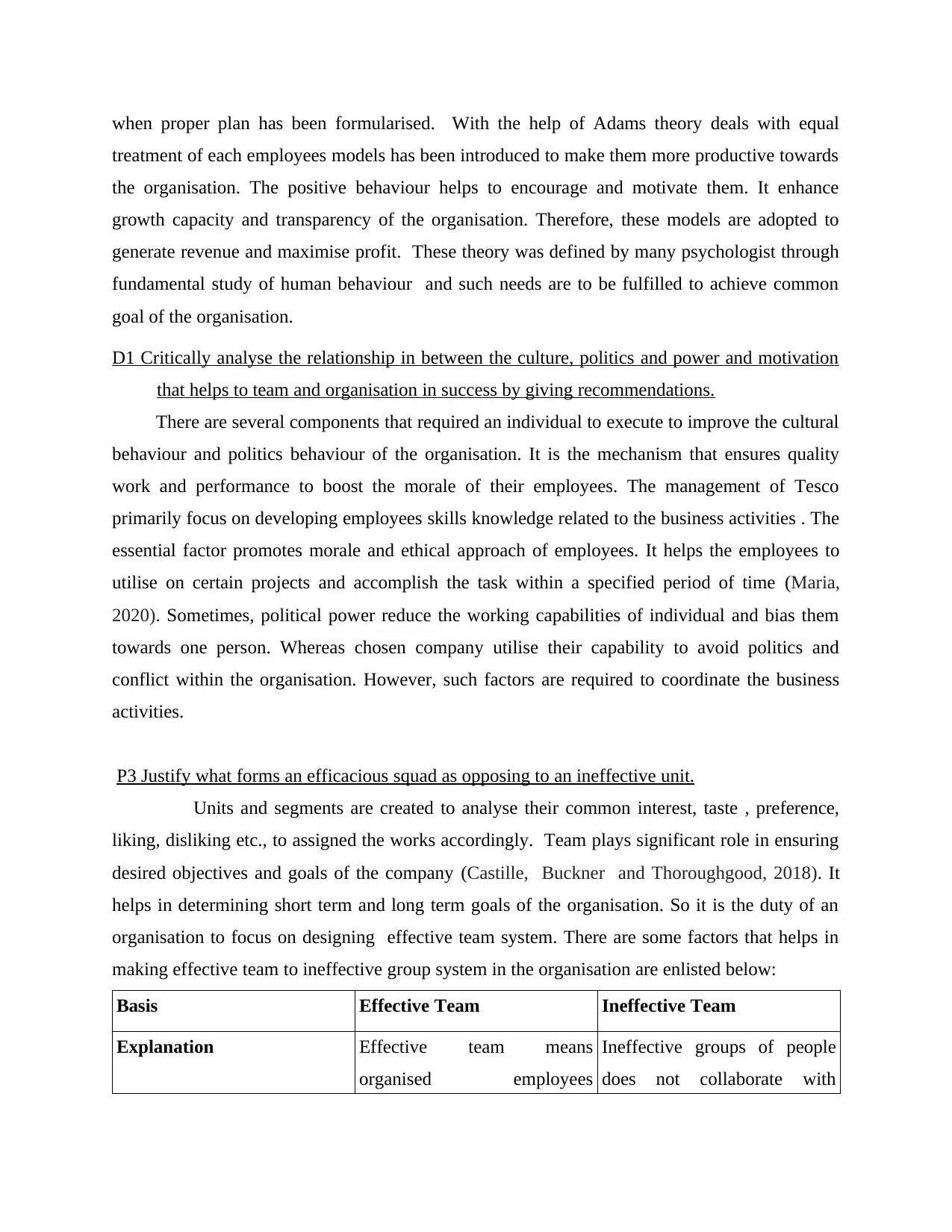
when proper plan has been formularised. With the help of Adams theory deals with equal
treatment of each employees models has been introduced to make them more productive towards
the organisation. The positive behaviour helps to encourage and motivate them. It enhance
growth capacity and transparency of the organisation. Therefore, these models are adopted to
generate revenue and maximise profit. These theory was defined by many psychologist through
fundamental study of human behaviour and such needs are to be fulfilled to achieve common
goal of the organisation.
D1 Critically analyse the relationship in between the culture, politics and power and motivation
that helps to team and organisation in success by giving recommendations.
There are several components that required an individual to execute to improve the cultural
behaviour and politics behaviour of the organisation. It is the mechanism that ensures quality
work and performance to boost the morale of their employees. The management of Tesco
primarily focus on developing employees skills knowledge related to the business activities . The
essential factor promotes morale and ethical approach of employees. It helps the employees to
utilise on certain projects and accomplish the task within a specified period of time (Maria,
2020). Sometimes, political power reduce the working capabilities of individual and bias them
towards one person. Whereas chosen company utilise their capability to avoid politics and
conflict within the organisation. However, such factors are required to coordinate the business
activities.
P3 Justify what forms an efficacious squad as opposing to an ineffective unit.
Units and segments are created to analyse their common interest, taste , preference,
liking, disliking etc., to assigned the works accordingly. Team plays significant role in ensuring
desired objectives and goals of the company (Castille, Buckner and Thoroughgood, 2018). It
helps in determining short term and long term goals of the organisation. So it is the duty of an
organisation to focus on designing effective team system. There are some factors that helps in
making effective team to ineffective group system in the organisation are enlisted below:
Basis Effective Team Ineffective Team
Explanation Effective team means
organised employees
Ineffective groups of people
does not collaborate with
treatment of each employees models has been introduced to make them more productive towards
the organisation. The positive behaviour helps to encourage and motivate them. It enhance
growth capacity and transparency of the organisation. Therefore, these models are adopted to
generate revenue and maximise profit. These theory was defined by many psychologist through
fundamental study of human behaviour and such needs are to be fulfilled to achieve common
goal of the organisation.
D1 Critically analyse the relationship in between the culture, politics and power and motivation
that helps to team and organisation in success by giving recommendations.
There are several components that required an individual to execute to improve the cultural
behaviour and politics behaviour of the organisation. It is the mechanism that ensures quality
work and performance to boost the morale of their employees. The management of Tesco
primarily focus on developing employees skills knowledge related to the business activities . The
essential factor promotes morale and ethical approach of employees. It helps the employees to
utilise on certain projects and accomplish the task within a specified period of time (Maria,
2020). Sometimes, political power reduce the working capabilities of individual and bias them
towards one person. Whereas chosen company utilise their capability to avoid politics and
conflict within the organisation. However, such factors are required to coordinate the business
activities.
P3 Justify what forms an efficacious squad as opposing to an ineffective unit.
Units and segments are created to analyse their common interest, taste , preference,
liking, disliking etc., to assigned the works accordingly. Team plays significant role in ensuring
desired objectives and goals of the company (Castille, Buckner and Thoroughgood, 2018). It
helps in determining short term and long term goals of the organisation. So it is the duty of an
organisation to focus on designing effective team system. There are some factors that helps in
making effective team to ineffective group system in the organisation are enlisted below:
Basis Effective Team Ineffective Team
Explanation Effective team means
organised employees
Ineffective groups of people
does not collaborate with
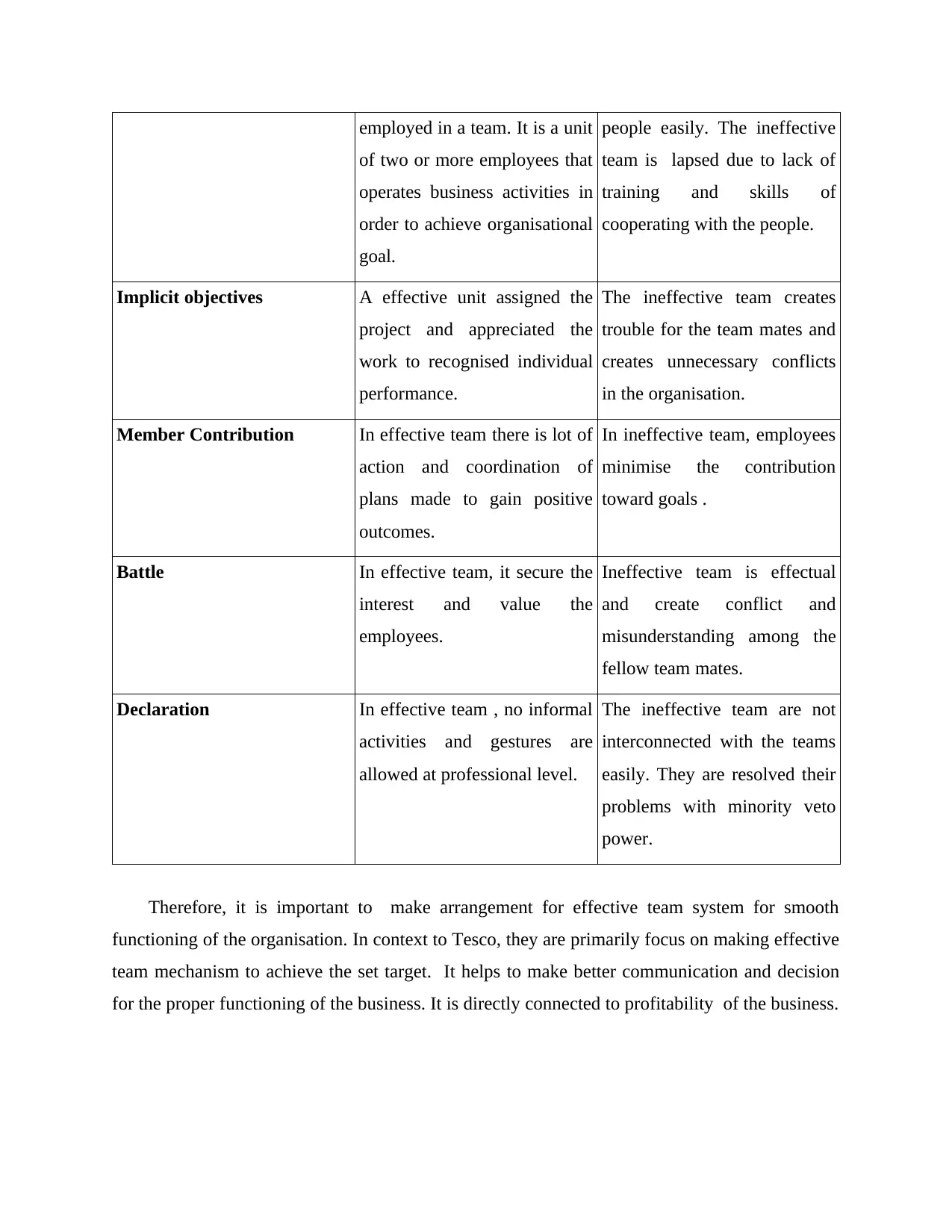
employed in a team. It is a unit
of two or more employees that
operates business activities in
order to achieve organisational
goal.
people easily. The ineffective
team is lapsed due to lack of
training and skills of
cooperating with the people.
Implicit objectives A effective unit assigned the
project and appreciated the
work to recognised individual
performance.
The ineffective team creates
trouble for the team mates and
creates unnecessary conflicts
in the organisation.
Member Contribution In effective team there is lot of
action and coordination of
plans made to gain positive
outcomes.
In ineffective team, employees
minimise the contribution
toward goals .
Battle In effective team, it secure the
interest and value the
employees.
Ineffective team is effectual
and create conflict and
misunderstanding among the
fellow team mates.
Declaration In effective team , no informal
activities and gestures are
allowed at professional level.
The ineffective team are not
interconnected with the teams
easily. They are resolved their
problems with minority veto
power.
Therefore, it is important to make arrangement for effective team system for smooth
functioning of the organisation. In context to Tesco, they are primarily focus on making effective
team mechanism to achieve the set target. It helps to make better communication and decision
for the proper functioning of the business. It is directly connected to profitability of the business.
of two or more employees that
operates business activities in
order to achieve organisational
goal.
people easily. The ineffective
team is lapsed due to lack of
training and skills of
cooperating with the people.
Implicit objectives A effective unit assigned the
project and appreciated the
work to recognised individual
performance.
The ineffective team creates
trouble for the team mates and
creates unnecessary conflicts
in the organisation.
Member Contribution In effective team there is lot of
action and coordination of
plans made to gain positive
outcomes.
In ineffective team, employees
minimise the contribution
toward goals .
Battle In effective team, it secure the
interest and value the
employees.
Ineffective team is effectual
and create conflict and
misunderstanding among the
fellow team mates.
Declaration In effective team , no informal
activities and gestures are
allowed at professional level.
The ineffective team are not
interconnected with the teams
easily. They are resolved their
problems with minority veto
power.
Therefore, it is important to make arrangement for effective team system for smooth
functioning of the organisation. In context to Tesco, they are primarily focus on making effective
team mechanism to achieve the set target. It helps to make better communication and decision
for the proper functioning of the business. It is directly connected to profitability of the business.
⊘ This is a preview!⊘
Do you want full access?
Subscribe today to unlock all pages.

Trusted by 1+ million students worldwide
1 out of 21
Related Documents
Your All-in-One AI-Powered Toolkit for Academic Success.
+13062052269
info@desklib.com
Available 24*7 on WhatsApp / Email
![[object Object]](/_next/static/media/star-bottom.7253800d.svg)
Unlock your academic potential
Copyright © 2020–2025 A2Z Services. All Rights Reserved. Developed and managed by ZUCOL.





